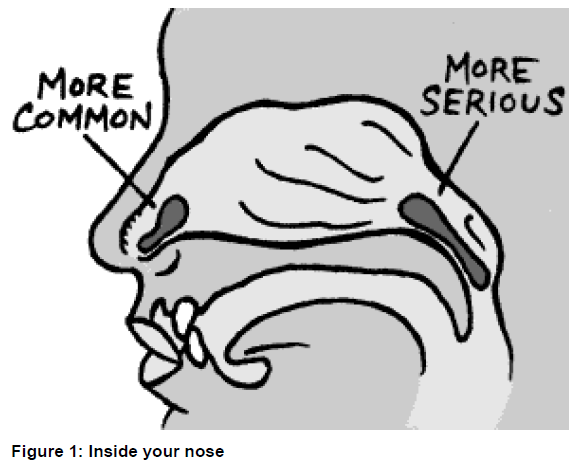Discharge information following a nosebleed (epistaxis)
Having a nosebleed is common and it is usually mild and easily treated. Some nosebleeds can be more severe which is usually the case in older people who have other medical conditions. This page gives you information about what causes a nosebleed and the different treatments available for children and adults.
What causes nosebleeds?
During a nosebleed, blood flows from one or both nostrils and can last from a few seconds to over 10 minutes.
Nosebleeds can be caused by a number of different factors which are not always easy to identify.
Nosebleeds can start just inside your nostrils (anterior) or at the back of your nostrils (posterior). Anterior and posterior nosebleeds usually have different causes.
Anterior nosebleeds
The most common place for a nosebleed to start is just inside the nostrils by the septum (middle of the nostrils).
This is due to the delicate blood vessels inside your nose becoming damaged.
This can happen easily. The most common causes for anterior nosebleeds include:
- picking your nose.
- blowing your nose very hard.
- a minor injury to your nose.
- colds and stuffy noses, such as when you have hay fever.
- changes in humidity or temperature causing the inside of your nose to become dry and cracked.
- cocaine use.
Posterior nosebleeds
Sometimes, bleeding can come from the blood vessels deeper inside the nose.
Bleeding can be caused by a number of things including:
- medication such as aspirin and other blood thinners.
- medical conditions such as haemophilia or Von Willebrand disease.
- a blow to the head.
- recent nasal surgery.
- high blood pressure and atherosclerosis (hardened arteries).
Posterior nosebleeds are much less common and usually affect older adults. They can be serious because the blood flow is heavy. If the bleeding continues for over 20 minutes, please seek advice from NHS 111.
What to do if you have a nosebleed?
When you have a nosebleed there are some simple steps you can take to help it stop:
- Sit down and firmly pinch the soft part of your nose, just above your nostril openings, for 10 to 15 minutes.
- Lean forward and breathe through your mouth – this will drain the blood down your nose instead of it going down the back of your throat.
- Place an ice pack or bag of frozen vegetables covered with a towel on the bridge of your nose.
4. Do not lie down, as this will increase the pressure in the blood vessels of your nose.
Steps that may prevent further bleeding
- Avoid hot drinks, hot baths, alcohol, smoking, straining on the toilet, heavy lifting and exercise for a few days.
- Avoid both blowing your nose and picking the clot.
- Avoid nasal sprays if not prescribed by a healthcare professional.
When to seek medical advice
If after 20 minutes your nose is still bleeding heavily and there are no signs of it slowing down, contact NHS 111 for advice. If the person is unwell and has other health conditions, telephone 999.
Usually, the bleeding will stop if you have followed the advice on this page. No further treatment will be needed. However, please contact your GP or NHS 111 if:
- the patient is under 2 years old and has not injured their nose or face.
- you have had several nose bleeds over the last few days.
- you are taking blood thinning (anticoagulant) medication.
Further information
NHS111
Tel: 111
NHS UK
www.nhs.uk/Conditions/nosebleed/Pages/introduction.aspx
British Red Cross
Learn first aid for a child who has a nosebleed.
www.redcross.org.uk/first-aid/learn-first-aid-for-babies-and-children/nosebleed
